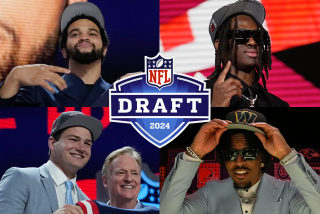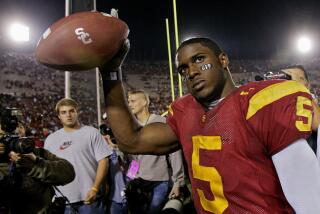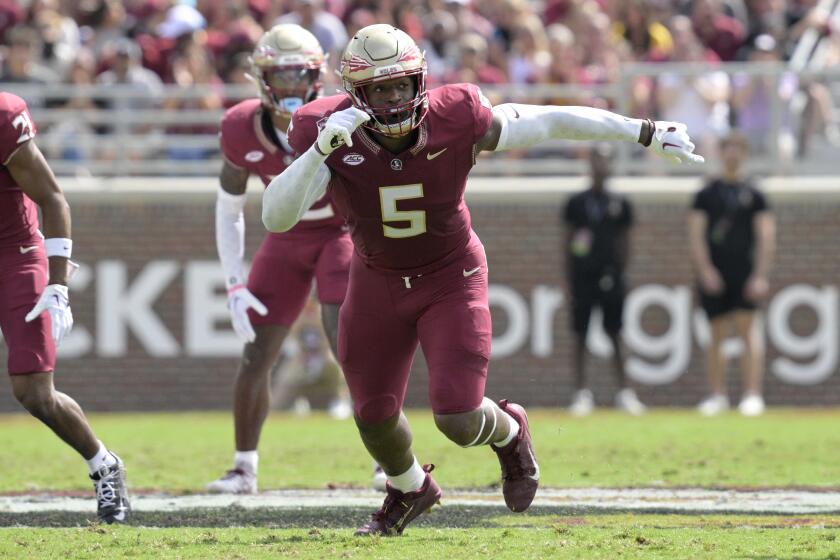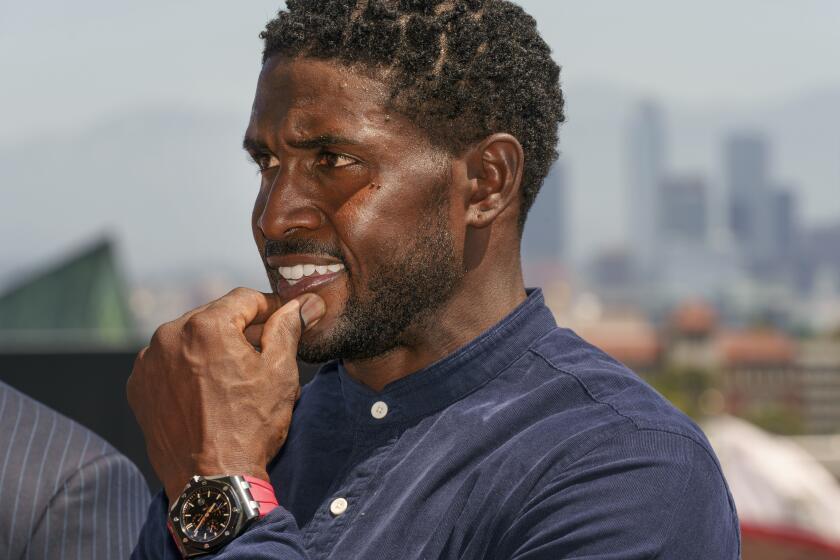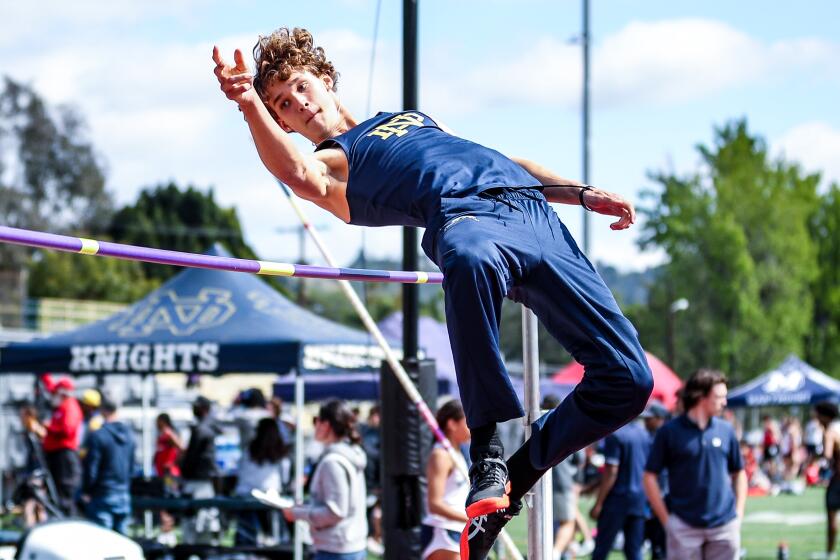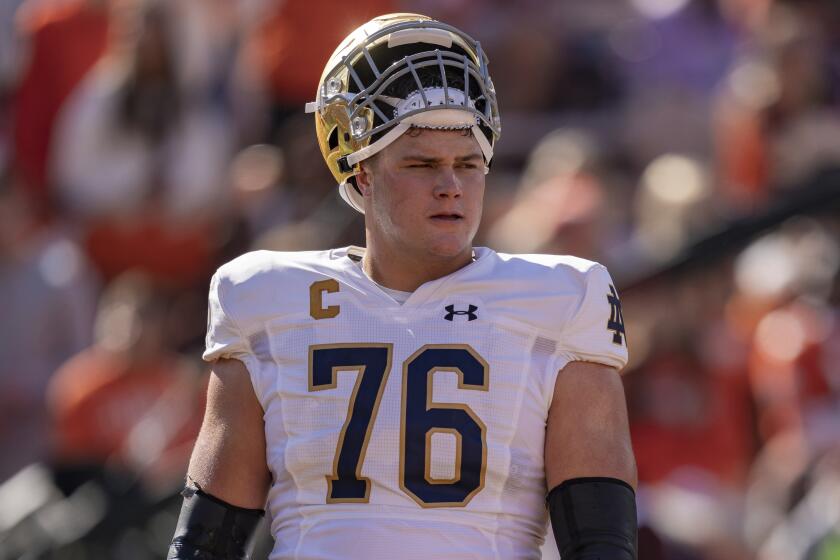Game on! Chinese, Americans in ‘pingpong diplomacy’ rematch
George Braithwaite crouched behind the pingpong table, then uncoiled and smashed the ball at Liang Geliang, who sent back a forehand laced with heavy spin.
Game on!
Thirty-seven years after the two men participated in a week of table tennis exhibition games in China that helped open the communist country to the world, they met for a rematch today at the Richard Nixon Library & Birthplace.
“I tried to make it as entertaining as I could for the crowd,” said Braithwaite, whose skilled shots belied his age of 73. “I wasn’t playing to win. The emphasis is friendship first, competition second.”
Maybe so, but the players took things seriously enough to request the curtains be closed and no flash photography allowed during the matches.
During a lengthy rally, Braithwaite got a laugh when he announced, “This is hard work, isn’t it?” He took a bow after winning another long point with a smash, then patted the net in thanks when a net-cord shot went in his favor.
Liang, now 58, rallied after losing the first game to take the best-of-5 match 3-1. The men, still lean and limber after all these years, smiled and embraced after Braithwaite’s forehand sailed off the table on match point. They received a standing ovation.
“It’s my great honor to be part of the event and also to be part of pingpong diplomacy to promote friendship between our two countries, between our two peoples,” Liang said in Mandarin through a translator.
About 200 people watched as the small white ball whizzed through the air during the matches played in a replica of the White House East Room. Gazing sternly upon the action were founding father George Washington, his wife Martha and former presidents Teddy Roosevelt and William McKinley, whose portraits hang on the walls.
Chinese dancers in red dresses rhythmically snapped red fans, two acrobats flung themselves about and two colorful dragons cavorted to the music in a pre-match performance.
Khoa Nguyen of San Jose, a two-time Olympian, was the only American winner. He defeated former world champion Zhang Lei 3-2.
Qiao Yunping, an Olympic silver medalist in doubles, beat Tawny Banh of San Gabriel 3-2 in the women’s match. Current world junior champion Song Shichao defeated 2004 Olympian Mark Hazinski of South Bend, Ind., 3-1.
Braithwaite was part of the U.S. national team invited to China in April 1971 -- among the first Americans to visit the country since 1949.
The pingpong diplomacy tour was a prelude to Richard Nixon’s trip to China in February 1972, when he became the first U.S. president to visit the country. His trip paved the way for normalizing relations between the two nations.
Later that year, Nixon hosted the Chinese national team for pingpong matches in the White House Rose Garden.
“The small pingpong ball moved the big earth ahead,” Liang said in remarks to the library crowd after his match. “Both China and the U.S. were hoping to improve bilateral relations, but had been waiting for the right chance. To our surprise, the small pingpong ball became the icebreaker.”
Liang is a professor at Peking University in Beijing and runs his own table tennis club, allowing him still to play “day and night.”
He expressed confidence that the upcoming Beijing Olympics will be a success.
“We can see so many great changes in Beijing and also other cities in China,” he said through a translator. “From the government, from the common people, from our citizens, different areas, we are all prepared and we are ready for the games.”
Liang said last month’s devastating earthquake in China showed the world how his country has changed.
“We did see our government’s preparation and quick response for anything,” he said. “It’s actually shown our unity.”
Braithwaite, a native of Ghana now retired from a 35-year career at the United Nations, still plays pingpong five days a week and does some coaching. He believes China has changed for the better, and he anticipates an openness during the Summer Olympics that didn’t exist in 1971.
“When athletes meet under the same roof, they have one goal, that’s to compete and communicate in friendly ways with each other,” Braithwaite said.
“But when governments meet and everything becomes political, there is a lot of deception involved. It’s not as straightforward. Their intention is to show the rest of the world how much progress has really taken place.”
More to Read
Get our high school sports newsletter
Prep Rally is devoted to the SoCal high school sports experience, bringing you scores, stories and a behind-the-scenes look at what makes prep sports so popular.
You may occasionally receive promotional content from the Los Angeles Times.
